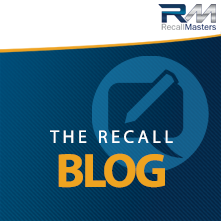What Do You Think About Whistle-Blowers?
What Do You Think About Whistle-Blowers?
A Blog Post by Sean Reyes, Chief Marketing Officer for Recall Masters
If you’ve never seen the movie “Titanic,” you know the famous ending sequence where Rose is floating in freezing water on top of a door. As the frost sets in, lifeboats come but think that everyone has perished and that there are no survivors. Rose, however, is still alive and remembers that a fellow victim of this horrible disaster had a whistle. She abandons the safety of her floating door and swims over to the person with the whistle… and starts to sound it. She eventually gets noticed by the rescuers and is ultimately saved from the same fate that her fellow passengers and crew succumbed to.
Recalls happen quite often. Some of them might have been preventable at their birth – while on the assembly line. In the interest of maintaining production levels and filling the supply chain, some can be overlooked, or known but not corrected. But employees do notice this happening and it can get ugly… and expensive! In November 2021, CNN published a story about this and the largest award ever made to a whistleblower – an ex-engineer for Hyundai – who received $24 million for informing the NHTSA about safety lapses.
How does this affect the relationship between an OEM and engineers moving forward? It’s definitely the strategy that Crime Stoppers embraced offering rewards for the capture and arrest of wanted criminals. What we don’t know is the motive behind this strategy. Perhaps the government is trying to prevent future recalls at their source. By offering cash rewards to employees of OEMs, perhaps employees will be more vigilant in reporting safety defects on the assembly line before they get to a dealership and, ultimately, in the hands of consumers. This can, however, create a wedge between the government and the OEMs by essentially using the OEM’s own employees to police their employer.
Could this become a snowball of engineers and factory workers crying wolf in the hopes of a big payday even further diluting the authenticity of reports making the government’s job harder to identify which reports are valid versus which are not? On the flip side, could it lead OEMs to slow production to prevent these instances so as not to be held liable for any issues after the fact? This, of course, leads to less new vehicle inventory which hurts car dealers by providing them with fewer vehicles to sell.
Some may argue that this strategy of huge payouts to whistleblowers could lead to MORE recalls rather than less simply because of the – perhaps – quantity of unfounded reports by engineers and factory workers looking for a big payday and/or the lack of resources for the government to follow up with all of them. If you want to get even more cynical, an OEM could simply start diluting its staff when it feels threatened. All of these possibilities bring harm in one way or another to various parties.
These days new cars cannot be sold with an open safety recall, but what is not always clear is how many of those new cars delivered to dealerships actually have safety issues from the start? And how long before these hidden defects become an official recall. A year? Two? All the while a consumer is driving their new vehicle with an unidentified (or unreported) safety issue, completely unknown to them.
The point is to ensure that vehicles are safe from the start. Nobody’s perfect and mistakes happen but, in the end, it is the consumer driving the vehicles and their fellow drivers’ lives that are at stake. Whistle away and hope the OEMs fix the issues before those vehicles are headed on a 16-wheeler to dealerships. With everyone’s cooperation and quick action, it is not outside the realm of possibility for the trio of the government, the OEMs, and the frontline workers to spot these things and take corrective measures immediately… which would ultimately lead to LESS recalls and safer roads for everyone.
About the Author


